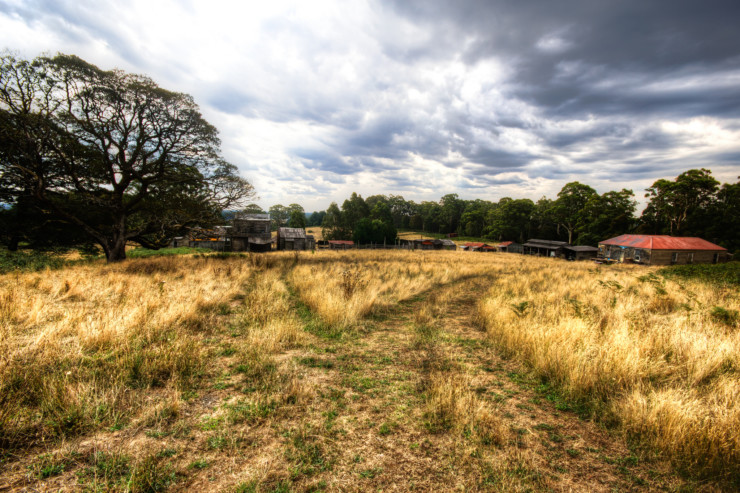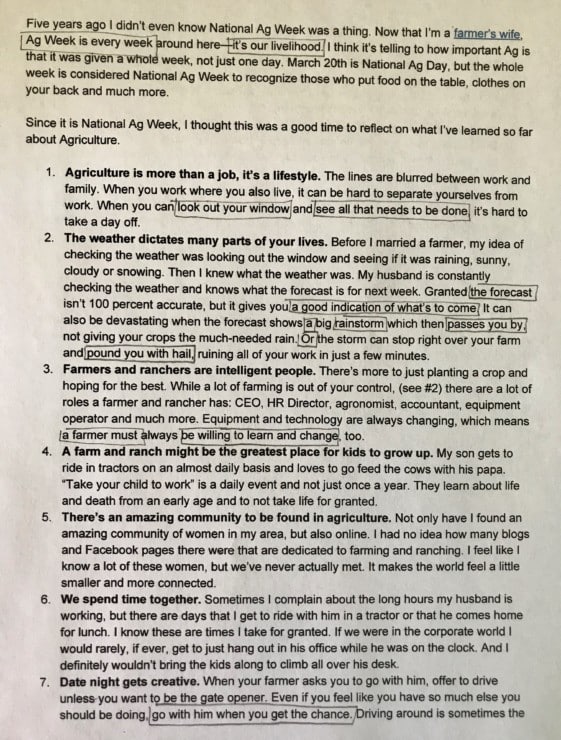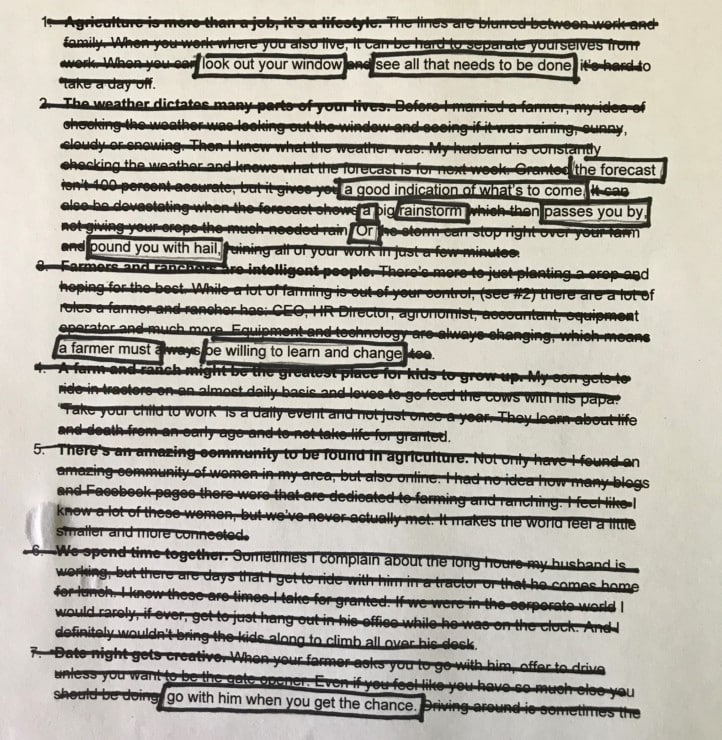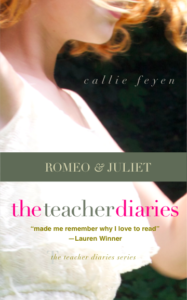One practice I like to teach when unfamiliar concepts are being introduced is a form of poetry called Blackout Poetry. These are poems we unearth from a text.
In my experience, unearthing poetry from a piece of literature or a news article I don’t yet fully grasp puts a sense of play back into reading and comprehension. It also allows me to create with something I don’t completely understand.
Try It
Find a text on farming that you can use to hunt around for a poem. Look for newspaper articles on agriculture, harvest, farmers markets, or even the weather report. Read some of E.B. White’s essays about his experience on a farm. (Confession: I’m jealous of his ability to write fluently when it comes to city and farming landscapes.) Try to find a piece that’s new to you. That is, look for something about farming that you don’t know much about already. This will give your poetry hunt more urgency and will allow you to find the “heart” of the text. I used my friend and fellow writer Stacy Bronec’s essay 10 Reasons Farming Is More Than You Might Think.
Once you’ve chosen a piece, read it through. Next, circle or draw a square around words or phrases that jump out at you. You’re looking for words that sing, that shimmer and shine, words that make you smile or catch your breath when you read them. When you’ve finished marking up the text, go back to the top and see what you have. Here are the pencil marks I made on Stacy’s piece:
Next, black out everything you don’t want to keep. Here’s mine:
If you like, you can copy out the words you’ve kept. Here’s my farm poem, with an added title and minor changes to create correct grammar:
Farming
Look out your window
see all that needs to be done
the forecast
a good indication of what’s to come
a rainstorm
passes you by
or
pounds you
with hail
a farmer must
be willing to learn and change
go with him when you get the chance.
Featured Poem Excerpt
Thanks to everyone who participated in our recent poetry prompt. Here’s part of a poem from Katie we enjoyed:
Apricots
…from the cylinder
in the salad bar.
Small halves of sunshine…
—Katie
Photo by Adam Selwood Creative Commons, via Flickr. Post by Post by Callie Feyen, author of The Teacher Diaries: Romeo and Juliet.
Callie Feyen’s students are blessed, as are the teachers who will read her book (and their own students, who will in turn benefit from it). But more than that, there’s the special excitement of reading the first memoir of a young writer with a compelling voice. Brava!
—John Wilson, Editor, Books & Culture, 1995-2016
- Poetry Prompt: Courage to Follow - July 24, 2023
- Poetry Prompt: Being a Pilgrim and a Martha Stewart Homemaker - July 10, 2023
- Poetry Prompt: Monarch Butterfly’s Wildflower - June 19, 2023




Donna Falcone says
Oooooo Callie – that’s like magic! Thank you for laying it out so visually – it really motivated me to try!
Kaite… small halves of sunshine…. oh my goodness that is juicy! 🙂
Katie says
Callie,
Thank you for featuring part of my apricots poem:)
Cannot wait to try Blackout Poetry!
Donna,
Thank you:)
Makes me smile and drool all over again remembering how happy I was to see apricots in that salad bar and how their taste made that summer day sweeter:)
Sandra Heska King says
I have an old Pictorial Review Standard Cook Book (Special 1931 Edition) in which I found yellowed sheets where my mother-in-law had planned various menus (including diagrammed table setups) for local farming events. I’m bummed because now I can’t find the book, so I hope it’s still packed somewhere. Anyway, I wrote a blog post about it that I titled “Between the Lines” a few years back. So I used that title. The words of this “poem” are taken are taken from my mother-in-law’s notes.
And Katie… small halves of sunshine. Sweet!
Between the Lines
Charlotte Grange Fried Chicken Supper
October 18, 1941
Served 190 persons
Planned on 200
25 chickens–none left
1-1/2 bushels potatoes–none left
50 pounds of cabbage
3 heads left, weighing 20 pounds
32 pounds of cottage cheese
40 quarts of applesauce
19 pies, 3 cakes and 3 quarts
of whipping cream
diluted for coffee.
Kieser Farm Face-Lifting Lunch
September 15, 1949
Planned on 1000 people
Mrs. Fulton’s barbeque recipe
serves 250
hamburger buns for $8.82
from Holsum Bread Company
ran out.
pies and fried cakes
chips and ice cream
on north and south sides
gum and candy on the east
cashiers on the west.
Dave Malone says
Fun closing. 🙂
Sandra Heska King says
Thanks. I wish Mom had written down what the price of lunch was. 🙂
Dave Malone says
🙂
Callie Feyen says
Sandra,
This reminds me of a cookbook I found in my Grandma Ayanoglou’s kitchen after she died. It is slim, and typed out with hand drawn illustrations. It looks like one of those cookbooks church ladies would put together. I took the cookbook because it made me laugh – there is no way my Grandma Ayanoglou, who was born in Aleppo, Syria and came to the US on a boat she almost didn’t get on (along with two daughters under 6), needed a cookbook. Nobody told her how to cook or bake, I will say that much. And that woman did not share recipes. “Figure it out yourself,” she’d say. “Now, go play.”
Anyway, I still have the cookbook because I have no clue why she kept it except for a laugh, and I figure even though I do use it quite frequently, I’m in on the joke. Sort of.
These poems are scrumptious. I can hear your MIL’s voice in these notes: sturdy and businesslike. I like “3 quarts/of whipping cream/diluted for coffee.” I can taste those lines.
Also, a Face-Lifting Lunch! I must learn what that is. It sounds like the beginning of a Flannery O’Connor story. This almost reads like a journal entry. I remember I used to take notes on my day in the boxes of a planner I had for writing down school assignments. They read just like this except they’d go like this: wore: yellow shorts with matching blue and yellow striped t-shirt; went to 7-11 with Celena to get Cherry slurpees; watched Say Anything instead of doing homework…….I don’t a lick of pre-algebra, but I can tell you what I wore in April of 1990.
Sandra Heska King says
Callie, I love the story of your grandmother. What a hoot. And your own journal entries. And what you wore–certainly you wouldn’t want to wear the same outfit too close to the last time. So fun. My father-in-law kept a diary. It usually consisted of things like:
“Went to hardware store to buy wire.”
“Called on the Smiths. Had apple pie.”
“76 degrees. Rainy.”
“Drove cattle to south farm.”
And then later in the nursing home…
“Dennis came. Watched the football game.”
“Had turkey and mashed potatoes. Terrible.”
I don’t know what a farm face-lifting is unless they were prettying the place up? Why would that take 1000 people? And why would you make them pay to eat?
Dave Malone says
Callie,
This is really fun. I love that you tackled farming. (On a tangent re E.B. White, I plan to read Charlotte’s Web this fall. Excited for that experience–I don’t believe I read it when I was a child.) Thanks for this inspiration.
Callie Feyen says
I’m glad you think so, Dave! I find Blackout Poetry is a great way to “come at” a topic that is a tad intimidating. Plus, it restores my belief that poetry can be found in anything, especially in what I am afraid of or overwhelmed with.
I also did not read Charlotte’s Web as a kid (I wasn’t a reader and that’s a story for another day), but read it with my daughters while I was in graduate school. I chose the book after reading EB White’s essay titled, “Death of A Pig.” This essay, I believe, was the work that led him to Charlotte’s Web. If you can get your hands on it, I recommend it. I have mine in a copy of his book called Essays of EB White.
Also, Charlotte’s Web is one of my favorite books, but not because of the pig or the spider. I love them, sure, but I love the very subtle growing up story of Fern. I also love Templeton the rat.
Dave Malone says
I’m glad I’m not the only one. 🙂
Though the essay can be found on The Atlantic site, I believe I’ll go old school and find the essay in one of his anthologies. Thank you so much for that. My grandfather was an Ozark farmer (and a cagey oft easily dislikable old man), yet. He really struggled with having his animals butchered. Looking forward to my EB White experience. 🙂
Stacy Bronec says
Thank you for choosing my essay for your post! I think your poem sums up my essay perfectly. I love seeing it from an outside perspective. What a fun topic for August!
Debbie says
I’ve wanted to try one of these so hopefully I can set aside the time to do it. I’m thinking of essays by Wendell Berry…
Bethany R. says
If you do, I hope you share it, Debbie. 🙂
Sandra Heska King says
What Bethany said.
Katie says
Farming Primer
It’s a lifestyle
constantly checking the weather
farm kids learn about life and death from an early age
and to not take life for granted
Ag Week is every week
it’s hard to take a day off
a farmer must be willing to learn and change
Ag Day is to recognize those who put food on the table
many blogs dedicated to farming and ranching
we don’t take what we do for granted
working from sunup to sundown isn’t just a phrase
it’s a passion and a calling
Amy Farley says
Well done!
Richard Maxson says
Homing Song
Kulning, a song of Norway,
a melody for the animals, to call them home,
a yodel from the herder, her voice
off the distant hills, the message caught
in symphonies of Grieg and imaginary
frozen lands, far back my own. I hear it.
I’m coming home.
https://www.mnn.com/lifestyle/arts-culture/blogs/kulning-haunting-beautiful-swedish-herding-call-thats-also-song
Amy Farley says
A strong sense of place. Interesting.
Amy Farley says
This is from a Wendell Berry Lecture in 2012 for the NEH. Perhaps cheating as his writing is already so poetic?
To imagine is to see most clearly.
Seeing with visionary force.
Affection is personal.
No distinction between the fate of the land and the fate of the people.
Abiding in and living from some chosen and cherished small place.
Husbanding all the goods by which we live.
Thrift and affection, connections to nature and to one another.
Ownership of a small property is personal, intimate, familiar and affectionate.
Affection involves us entirely.
An exhausted Wisconsin farm
Began its restoration
For affection
An ecologist, he felt an informed sorrow for the place in its ruin
He imagined it as it might be
A profound, delighted affection radiated from every sentence he wrote about it.
Affection leads to authentic hope.
____________________________________________________________________________________
Speak for human wholeness against fragmentation, disorder, and heartbreak.
Begin with a language not disturbed by mystery, things unseen.
Soul-sustaining habitations: houses, households, earthly places where lives can be made and loved
In defense of such dwellings the vocabulary that I have depended on:
Truth, nature, imagination affection, love, hope, beauty, joy.
In such words, we find our indispensable humanity without which we are lost and in danger
Adapting kindly the many human households to the earth’s many ecosystems
Land and people have suffered together
This has not been inevitable.
We do not have to live as if we are alone.
Dave Malone says
Love these poems!
Amy says
Thank you. I posted a longer one on my blog.
Sandra Heska King says
Can you leave a link, Amy? I clicked on your name, but it took me to a strange page
Amy Farley says
My blog is just34me.wordpress.com
Sorry, it has a certificate error on the link with just my first name.
Sandra Heska King says
Thanks! My favorite line from what you’ve “unblacked” here is, “To imagine is to see most clearly.” 🙂